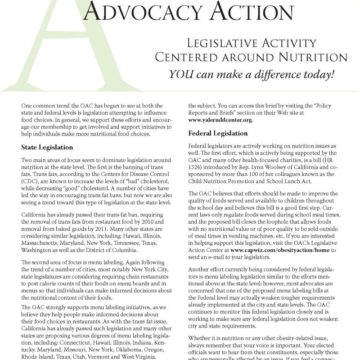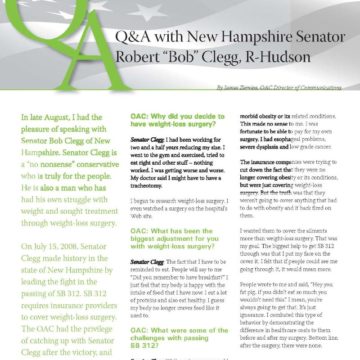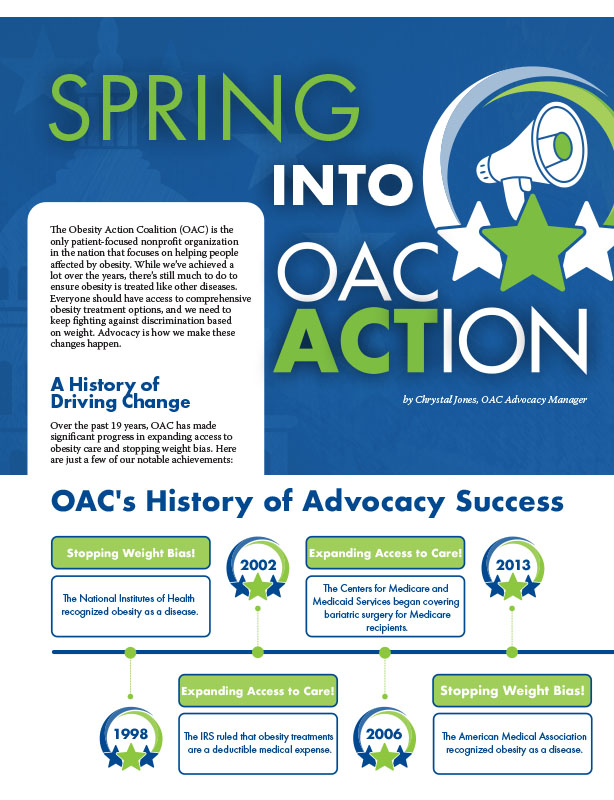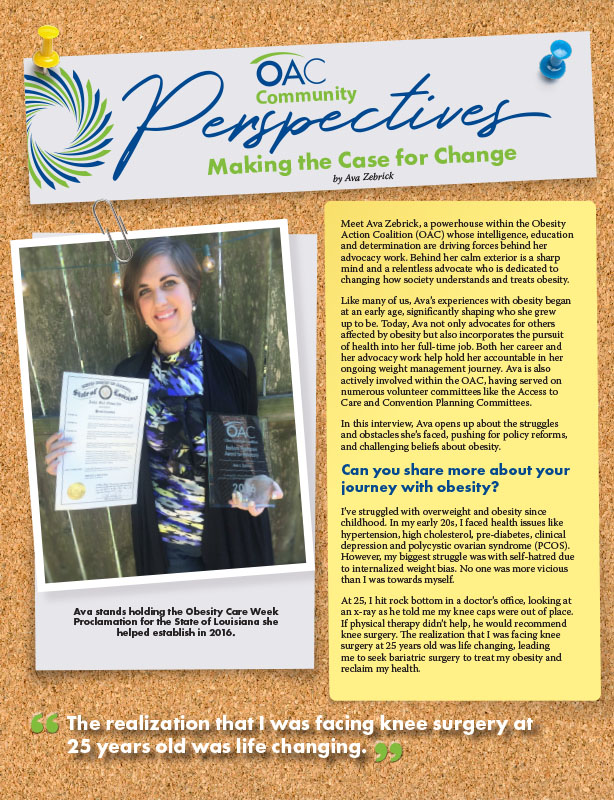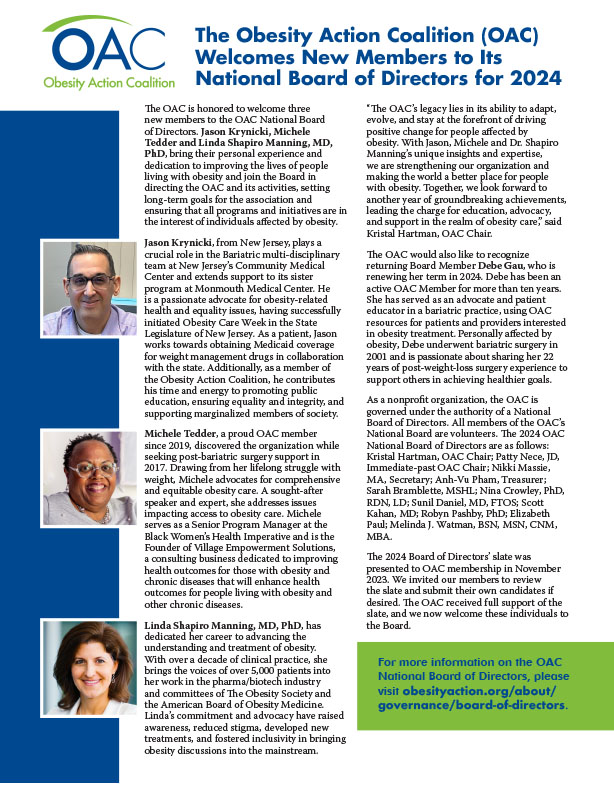You Might be an Advocate

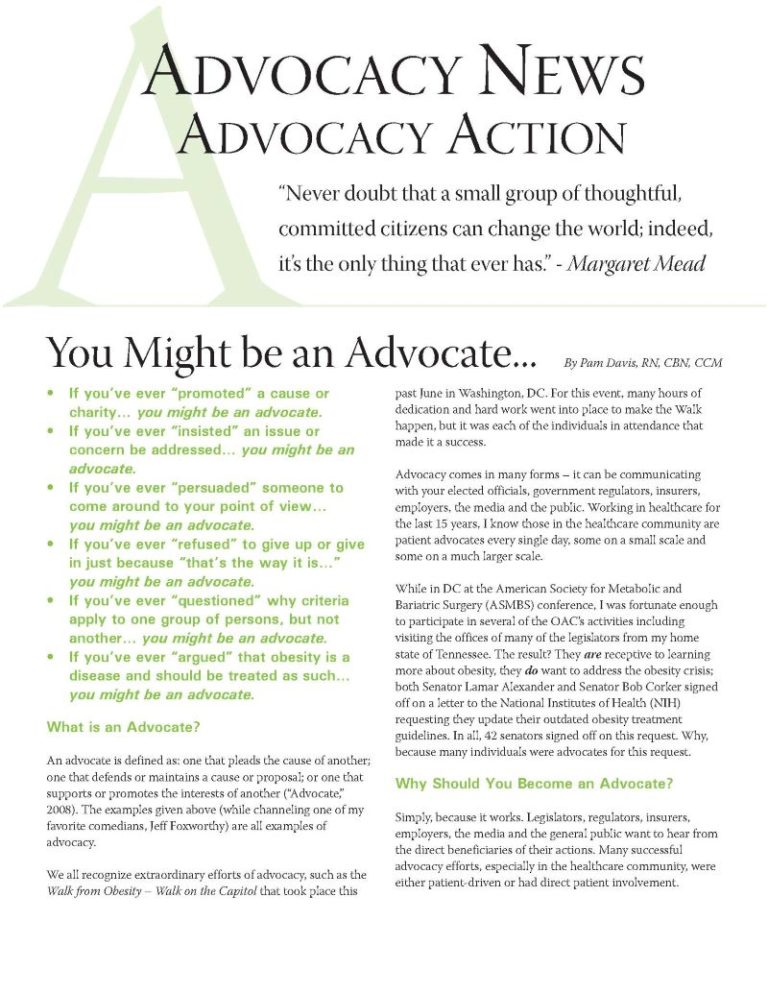
by Pam Davis, RN, CBN, MBA
Fall 2008
- If you’ve ever “promoted” a cause or charity…you might be an advocate.
- If you’ve ever “insisted” an issue or concern be addressed…you might be an advocate.
- If you’ve ever “persuaded” someone to come around to your point of view…you might be an advocate.
- If you’ve ever “refused” to give up or give in just because “that’s the way it is…” you might be an advocate.
- If you’ve ever “questioned” why criteria apply to one group of persons, but not another… you might be an advocate.
- If you’ve ever “argued” that obesity is a disease and should be treated as such… you might be an advocate.
What is an Advocate?
An advocate is defined as: one that pleads the cause of another; one that defends or maintains a cause or proposal; or one that supports or promotes the interests of another (“Advocate,” 2008). The examples given above (while channeling one of my favorite comedians, Jeff Foxworthy) are all examples of advocacy.
We all recognize extraordinary efforts of advocacy, such as the Walk from Obesity – Walk on the Capitol that took place this past June in Washington, DC. For this event, many hours of dedication and hard work went into place to make the Walk happen, but it was each of the individuals in attendance that made it a success.
Advocacy comes in many forms – it can be communicating with your elected officials, government regulators, insurers, employers, the media and the public. Working in healthcare for the last 15 years, I know those in the healthcare community are patient advocates every single day, some on a small scale and some on a much larger scale.
While in DC at the American Society for Metabolic and Bariatric Surgery (ASMBS) conference, I was fortunate enough to participate in several of the OAC’s activities including visiting the offices of many of the legislators from my home state of Tennessee. The result? They are receptive to learning more about obesity, they do want to address the obesity crisis; both Senator Lamar Alexander and Senator Bob Corker signed off on a letter to the National Institutes of Health (NIH) requesting they update their outdated obesity treatment guidelines. In all, 42 senators signed off on this request. Why, because many individuals were advocates for this request.
Why Should You Become an Advocate?
Simply, because it works. Legislators, regulators, insurers, employers, the media and the general public want to hear from the direct beneficiaries of their actions. Many successful advocacy efforts, especially in the healthcare community, were either patient-driven or had direct patient involvement.
And speaking of patient involvement, one of the easiest ways to get involved and start your advocating is to become a member of the OAC. The OAC is an organization that represents YOU, and membership is vitally important because it shows these key decision makers that you, along with so many, are an individual impacted and you want change!
Together, we can all work to:
- Educate legislators, patients, family members and the public
- Help gain access to medical treatment
- Advocate for safe and effective treatments
- Strive to eliminate the negative stigma associated with obesity
- Empower individuals with obesity to make a difference in their lives and the lives of others
What Does Advocacy Mean to You?
Does it sound like too much work or that it may take too much of your time? You don’t have to go to DC, you don’t have to write a letter, you don’t have to participate in the Walk from Obesity, you don’t even have to join the OAC; someone else will take on the cause, right? Someone else will advocate on your behalf, right?
No, they won’t; because no one can speak as effectively about your individual cause as you can. Speak up; speak out; write a letter; join a Walk; join the OAC; let someone know what you support and what “just ain’t right!”
Be careful though, when you do so… you might be an advocate!
Hear from an advocate who took action! The OAC had the privilege of interviewing Senator Bob Clegg (R-Hudson) who was the driving force behind passing an important piece of legislation.
About the Author:
Pam Davis, RN, CBN, CCM, is the Bariatric Program Director for Centennial Center for the Treatment of Obesity in Nashville, Tenn. Pam is a Registered Nurse, Certified Bariatric Nurse and Certified Case Manager. She is an active member of the ASMBS, serving as chair of the Allied Health Clinical Issues and Guidelines committee. She is a member of the Tenn. chapter of the ASMBS, CMSA, NABN and serves on the National Board of Directors for the Obesity Action Coalition. In 2001, Pam had laparoscopic Roux-en-Y gastric bypass surgery at Centennial and has since developed a passion for working with others living with obesity.
Reference:
Advocate. (2008). In Merriam-Webster Online Dictionary. Retrieved August 17, 2008, from https://www.merriam-webster.com/dictionary/advocate
by Chrystal Jones, OAC Advocacy Manager Spring 2024 The Obesity Action Coalition (OAC) is the only patient-focused…
Read Articleby Ava Zebrick Spring 2024 Meet Ava Zebrick, a powerhouse within the Obesity Action Coalition (OAC) whose…
Read ArticleThe OAC is honored to welcome three new members to the OAC National Board of Directors. Jason Krynicki,…
Read Article




